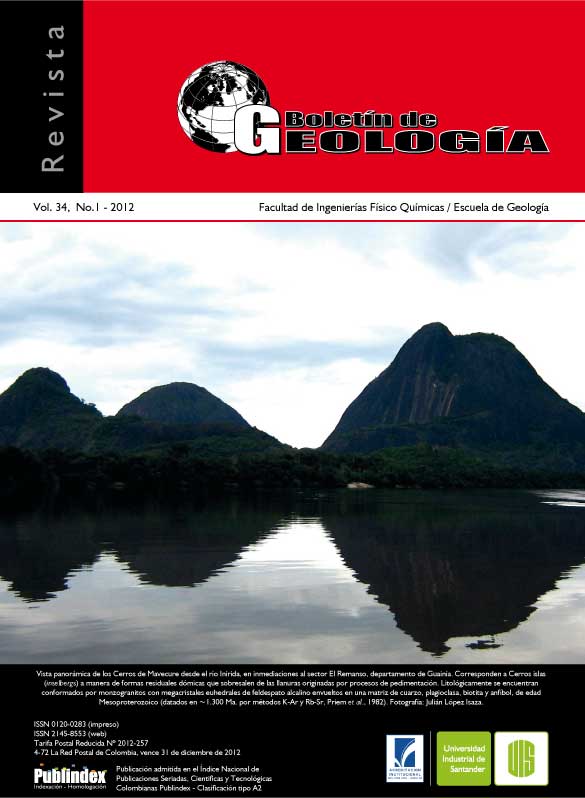ESTUDIO COMPARATIVO DE LA TRANSFORMACIÓN MINERALÓGICADE ARCILLAS COCIDAS DEL VALLE DE LABOYOS, CUENCA ALTA DELMAGDALENA (COLOMBIA)
Published 2012-08-24
How to Cite
Abstract
Las transformaciones mineralógicas durante el quemado de las arcillas del Valle de Laboyos en la Cuenca del Alto Magdalena (Colombia) fueron estudiadas. La cocción de las arcillas se llevó a cabo en el rango de temperatura 800-1200 ºC bajo condiciones oxidantes. Las transformaciones mineralógicas fueron investigadaspor difracción de rayos X (DRX) y microscopía electrónica de barrido (MEB). Importantes diferencias composicionales en las fases neoformadas se observaron en las arcillas. Paragénesis típicas con cuarzo, illita,caolinita, mica, feldespato potásico halloysita y plagioclasa fueron observadas. Varias fases minerales fueron identificadas en las arcillas quemadas, con productos de reacción incluyendo mullita, cuarzo residual, hematita,fase amorfa (vidrio generado por la fusion de feldespatos y arcillas) en las arcillas cocidas.
Palabras clave: Transformaciones mineralógicas, Arcillas, Valle de Laboyos, Fases neoformadas, Paragénesis.
Downloads
References
Amjad, J. 2000. Investigation of phases in soils used for brick-making. M.Phil. Thesis, University of Punjab, Lahore (Pakistan)
Aras, A. 2004. The change of phase composition in kaolinite- and illite-rich clay-based ceramic bodies. Applied Clay Science, 24(3-4): 257-269
Baccour, H., Medhioub, M., Jamoussi, F., Mhiri, T., and Daoud, A. 2008. Mineralogical evaluation and industrial applications of the Triassic clay deposits, Southern Tunisia. Materials Characterization, 59(11): 1613-1622
Bakker, J.G.M., Kleinendorst, T.W., and Geirnaert, W. 1989. Tectonic and sedimentary history of a late Cenozoic intramontane basin (The Pitalito Basin, Colombia). Basin Research, 2(3): 161-187.
Barsoum, M.W. 1997. Fundamental of Ceramics. McGraw-Hill, Singapore, 603p
Bogahawatta, V.T.L., and Poole, A.B. 1996. The influence of phosphate on the properties of clay bricks. Applied Clay Science, 10(6): 461-475.Bortz, S.A., Marusin, L.S., and Monk, C.B. Jr. 1990
A critical review of masonry durability standards. Proceedings of the 5th North American Masonry Conference, Illinous, USA, pp. 1523-1536
Brindley, G.W., and Maroney, D.M. 1960. High–temperature reactions of clay mineral mixtures and their ceramic properties: II, Reactions of Kaolinite-Mica-Quartz Mixtures Compared With the K2O-Al2O3-SiO2 Equilibrium Diagram. Journal of the American Ceramic Society, 43(19): 511-516.
British Geological Survey 2007. Brick clay: Geology and mineral planning factsheets for Scotland. Consulted on March 21 2010. http://www.scotland.gov.uk/Publications/2007/06/04121200/1
Brownell, W.E. 1976. Structural clay products. Springer-Verlag, New York, 231p
Cardenas, J.I., Núñez, A., and Fuquen, J.A. 2003. Geología de la Plancha 388 Pitalito – Memoria Explicativa. INGEOMINAS. Bogotá, Colombia, 128p
Carney, J.N. 2010. Comparative petrography of pottery sherds and potential geological source materials in the East Midlands. Open Report of the British Geological Survey, OR/10/034
Castellanos, O. (2005). Caracterización geológica de arcillas del Valle de Laboyos, Municipio de Pitalito, Huila. Bistua, 3(2): 43-53
